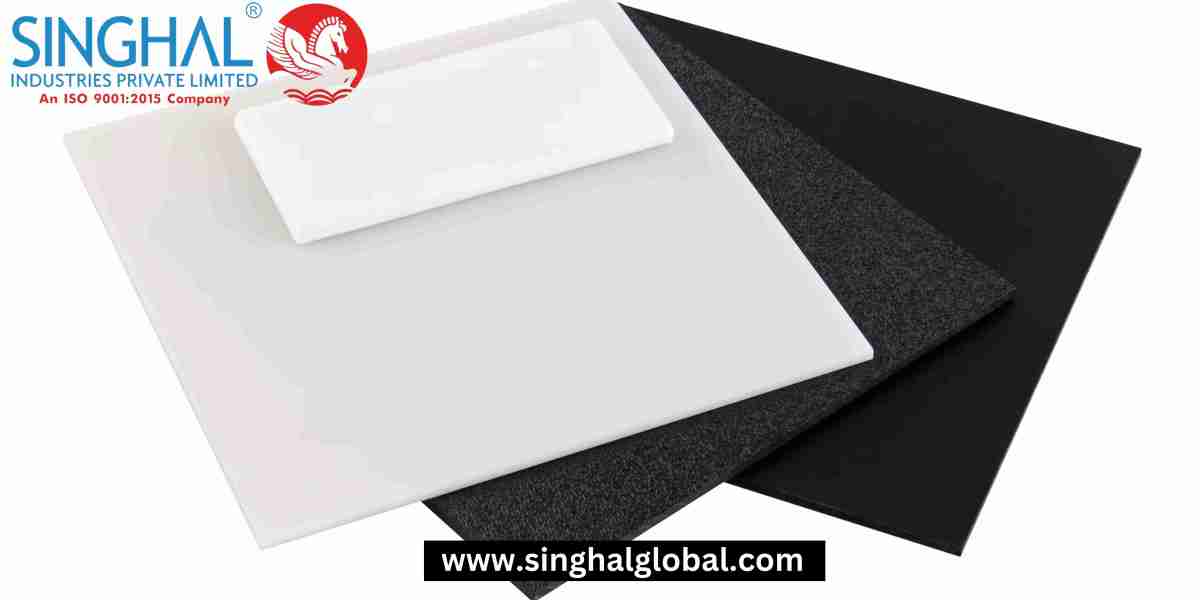ABS (Acrylonitrile Butadiene Styrene) plastic is one of the most widely used materials in various industries due to its durability, versatility, and ease of fabrication. ABS plastic sheets are commonly used in manufacturing, automotive, and construction, among other sectors. Known for their high impact resistance and robust nature, ABS plastic sheets are available in various thicknesses and sizes, such as the popular 1/8 Abs plastic sheet 4x8.
In this article, we will explore the benefits, applications, and key considerations when working with ABS plastic sheets. Whether you are a professional in the manufacturing industry or a DIY enthusiast, understanding the properties of ABS plastic can help you make informed decisions for your projects.
What is ABS Plastic?
ABS plastic is a versatile thermoplastic polymer composed of three primary components:
Acrylonitrile: Provides chemical resistance and heat stability.
Butadiene: Offers high impact strength and toughness.
Styrene: Contributes to ease of processing and gives ABS its characteristic rigidity.
ABS plastic is favored for its ability to be molded and fabricated into a wide range of shapes, from thin sheets to more complex forms. It combines the best attributes of these materials, making it highly effective for products that require strength, durability, and flexibility.
Key Properties of ABS Plastic Sheets
ABS plastic sheets offer several key properties that make them a popular choice for various applications. These include:
Durability and Impact Resistance
ABS plastic sheets are known for their toughness and resistance to physical impact. Whether used in heavy-duty applications like automotive parts or lightweight products like signage, ABS sheets can withstand significant force without cracking or breaking.
High Strength-to-Weight Ratio
ABS is a strong material, yet lightweight, making it easy to handle and use in a variety of settings. Its strength-to-weight ratio ensures that products made from ABS plastic are durable without being overly heavy.
Heat Resistance
ABS plastic can withstand higher temperatures than many other plastics, which is why it is often used in environments where heat is a factor, such as in automotive and industrial applications.
Ease of Fabrication
ABS sheets are easy to cut, mold, and weld. Whether you need to machine the plastic or thermoform it into specific shapes, ABS sheets offer high versatility in manufacturing processes.
Types of ABS Plastic Sheets
ABS plastic sheets come in various thicknesses, colors, and finishes to suit different applications. Some common types of ABS sheets include:
Standard ABS Sheets
These are the most commonly used ABS sheets in industries where high strength and rigidity are required. They are typically available in thicknesses ranging from 0.02 inches to several inches.
1/8" ABS Plastic Sheet 4x8
One of the most widely available options, the 1/8" ABS plastic sheet 4x8 is ideal for general-purpose applications, including signage, automotive parts, and custom DIY projects. The standard 4x8 feet size is convenient for larger projects and easy to handle for most applications.
Textured ABS Sheets
For applications requiring a non-slip or aesthetically appealing surface, textured ABS sheets offer a matte or patterned finish that can help with both function and design.
Colored ABS Sheets
ABS plastic sheets can also be produced in a range of colors, including black, white, red, blue, and more. Colored ABS sheets are often used in product housings, signage, and consumer goods.
Flame-Retardant ABS Sheets
In environments where fire safety is a concern, flame-retardant ABS sheets are available. These sheets meet specific safety standards to resist ignition and limit the spread of fire.
Why Choose ABS Plastic Sheets for Your Projects?
There are many reasons why ABS plastic sheets are the material of choice for numerous industries. Here are some of the top benefits:
1. Versatility
ABS sheets can be used in a wide range of applications, from automotive components and industrial equipment to interior design and consumer goods. Whether you need a durable material for outdoor use or a lightweight option for a decorative project, ABS plastic fits the bill.
2. Cost-Effectiveness
Compared to other engineering plastics like polycarbonate or acrylic, ABS sheets offer a more affordable alternative without sacrificing strength or durability. This makes them an ideal choice for both large-scale industrial production and small-scale, cost-conscious DIY projects.
3. Ease of Customization
ABS plastic sheets can be easily cut, drilled, and shaped to suit a variety of needs. This makes ABS a highly customizable material for a range of fabrication processes, such as CNC machining, thermoforming, and laser cutting.
4. Resistance to Weathering
ABS plastic offers good weather resistance, making it suitable for both indoor and outdoor applications. Its ability to withstand UV rays, moisture, and temperature fluctuations makes it a durable choice for signage and other products exposed to the elements.
Applications of ABS Plastic Sheets
ABS plastic sheets are used in a wide variety of industries, thanks to their unique combination of properties. Some of the most common applications include:
Automotive Industry
ABS sheets are frequently used in the automotive sector for making bumpers, dashboards, and other interior and exterior parts. The material's ability to resist impact and its light weight make it ideal for use in vehicle manufacturing.
Construction and Architecture
In construction, ABS sheets are used for both functional and aesthetic purposes. They are commonly found in cladding, roofing, and other building materials, where their durability and ease of maintenance make them an attractive option.
Signage
Due to its ease of customization, Abs plastic sheets suppliers is often used in the creation of signage, both for indoor and outdoor use. Its ability to retain color and resist fading from UV exposure makes it a long-lasting option for commercial signage.
Consumer Electronics
ABS is also used in the casing of consumer electronics such as laptops, phones, and other devices. Its durability and ease of manufacturing make it an ideal material for creating protective casings that can endure rough handling.
Benefits of Using 1/8" ABS Plastic Sheets 4x8
The 1/8" ABS plastic sheet 4x8 is a versatile and highly practical option for both professional and DIY projects. Here’s why this particular size and thickness are so popular:
1. Ideal Thickness for Versatility
The 1/8" thickness is a sweet spot for ABS plastic sheets. It provides a perfect balance between strength and flexibility. The material is thin enough to be lightweight and easy to handle, yet thick enough to be durable and impact-resistant. This makes it ideal for a wide range of applications, from signage and automotive parts to consumer goods and DIY crafts.
2. Convenient Size for Large Projects
The 4x8 sheet size is a standard in the industry, making it convenient for larger projects. Whether you're building a display board, creating prototypes, or constructing parts for a custom design, a 4x8 sheet gives you ample space to work with, reducing the need for multiple smaller sheets. This helps to streamline the project and cut down on material waste.
3. Easy to Cut and Fabricate
Because the 1/8" ABS plastic is thin enough for easy handling, it is highly customizable. You can cut it with standard cutting tools like jigsaws, table saws, or even utility knives (for smaller tasks). This makes it ideal for people who need a material that can be worked with easily without requiring specialized equipment.
4. Cost-Effective Solution
When purchased in bulk, 1/8" ABS plastic sheets in 4x8 size are cost-effective compared to other materials of similar strength and durability. For businesses and professionals, this size offers a more economical option, which reduces overall material costs.
5. Durability in Various Environments
ABS sheets, especially the 1/8" variety, are resistant to impact, weathering, and even UV degradation. This makes them suitable for both indoor and outdoor applications, where the material may face rough handling or exposure to the elements.
How ABS Plastic Sheets Are Produced
Understanding how ABS plastic sheets are produced can help buyers make better decisions and appreciate the material’s unique qualities.
1. The Process of Sheet Extrusion
ABS plastic sheets are typically produced using a process called extrusion. In extrusion, the plastic pellets are heated and forced through a mold to form continuous sheets of plastic. This process allows for precise control over thickness, texture, and surface finish.
2. Cooling and Cutting
Once the ABS plastic is extruded into sheets, it is cooled rapidly to ensure it hardens into its final form. After cooling, the sheets are cut into manageable sizes, such as the 4x8 dimensions commonly available in the market.
3. Additional Treatments
Some ABS sheets undergo further treatments, such as laminating a protective film onto the surface to increase scratch resistance or applying a specific texture for decorative or functional purposes (e.g., anti-slip surfaces).
Where to Buy ABS Plastic Sheets
When it comes to purchasing ABS plastic sheets, whether for professional or DIY use, it's important to consider a few factors that will ensure you get the right product.
1. Local Distributors
There are various local distributors and retailers where you can purchase ABS plastic sheets. Many of these companies offer various thicknesses, including 1/8" ABS plastic sheet 4x8, and can provide a range of colors and textures. For specific projects, it’s best to consult with distributors who specialize in plastic materials for custom needs.
2. Online Marketplaces
Online marketplaces like Amazon or dedicated plastic stores also offer ABS plastic sheets. These platforms often feature customer reviews and provide detailed product specifications, which can help you make a more informed choice. You can often find competitive prices and bulk buying options here as well.
3. Custom Orders
Some businesses and online retailers allow you to place custom orders for specific sizes and finishes of ABS sheets, ensuring you get exactly what you need for your project. If you're working on a project that requires precision, be sure to check with the vendor about customization options.
Factors to Consider Before Buying ABS Plastic Sheets
Before purchasing ABS plastic sheets, there are several important considerations that can impact the success of your project:
1. Thickness
ABS plastic sheets come in a range of thicknesses, from very thin sheets (like 0.02 inches) to thicker materials (like 1 inch or more). The thickness you choose depends on the intended application. For general use, the 1/8" ABS plastic sheet 4x8 is a versatile choice. However, for heavy-duty applications, a thicker sheet may be necessary.
2. Color and Finish
ABS sheets are available in a wide range of colors and finishes. You should choose a color that suits the aesthetic or functional needs of your project. If the sheet will be exposed to the elements, opting for UV-resistant colors or finishes may enhance its longevity.
3. Impact Resistance
Consider the environment in which the ABS plastic sheet will be used. Will it be exposed to high-impact forces? In such cases, choosing a thicker sheet with enhanced impact resistance will ensure the material holds up over time.
4. Temperature Resistance
If your project will be exposed to high temperatures, you should select ABS sheets that are specifically designed to withstand heat. ABS generally has good heat resistance, but if your application involves extreme temperatures, consider checking the temperature range before making a purchase.
Comparison: ABS Plastic Sheets vs. Other Materials
While ABS plastic sheets are highly versatile and widely used, it’s important to compare them to other materials to determine the best option for your specific needs. Here are some comparisons:
ABS vs. PVC
ABS plastic is tougher and more impact-resistant than PVC, making it a better choice for applications where durability is critical. However, PVC is more flexible and resistant to certain chemicals, so it may be preferred for some applications, like pipes or water-related projects.
ABS vs. Acrylic
Acrylic is clear and offers superior optical clarity compared to ABS, which is opaque. However, ABS is more durable, impact-resistant, and easier to work with, making it a better choice for rugged applications. Acrylic tends to be more brittle than ABS, making it susceptible to cracking under impact.
ABS vs. Polycarbonate
Polycarbonate is tougher than ABS and offers superior impact resistance, but it is also more expensive. ABS sheets are generally lighter and more cost-effective, making them ideal for applications where cost is a factor and extreme durability isn’t required.
Expert Insights on ABS Plastic Sheets
According to experts in the materials industry, ABS plastic remains a go-to choice for many projects due to its combination of strength, affordability, and ease of use. For example, John Smith, a materials engineer, states:
"ABS sheets continue to be an essential material for industries ranging from automotive to signage. Their adaptability and affordability make them the material of choice for most practical applications."
Innovations in ABS Plastic Sheet Production
The ABS plastic industry is constantly evolving. Some of the innovations include the development of eco-friendly ABS sheets made from recycled materials. Additionally, new processing techniques allow for more customized textures and finishes, such as matte, glossy, and even anti-microbial surfaces.
How to Cut, Shape, and Install ABS Plastic Sheets
ABS plastic sheets are incredibly easy to work with, whether you are cutting, shaping, or installing them. Here's a brief guide:
Cutting
ABS plastic can be cut with common tools such as jigsaws, hacksaws, or even a table saw. For more precise cuts, a circular saw with a fine-toothed blade works well.
Shaping
ABS sheets can be bent using heat, which allows for creative design flexibility. Simply apply heat using a heat gun and shape the sheet while it’s pliable.
Installation
For installation, Abs sheet manufacturers can be mounted using screws, adhesive, or even welded together using a plastic welding technique. When installing ABS sheets outdoors, consider using UV-resistant adhesives to prevent degradation over time.
Common Problems with ABS Plastic Sheets
Although ABS plastic sheets are durable, they can face certain challenges, including:
Scratching: ABS plastic can be scratched by sharp objects. For aesthetics, consider using a protective coating or selecting a textured finish.
Warping: In extreme heat, ABS sheets can warp. Be cautious of where the material will be used and avoid direct exposure to high temperatures unless the material is rated for it.
Discoloration: Over time, ABS sheets exposed to UV light can fade or discolor. Using UV-resistant coatings or finishes can help mitigate this.
Future Outlook for ABS Plastic Sheets
The demand for ABS plastic sheets is expected to grow, driven by their use in high-growth sectors like automotive, construction, and electronics. As sustainability becomes increasingly important, the development of biodegradable or recyclable ABS products will likely play a crucial role in the future of the material.
Conclusion
ABS plastic sheets offer an excellent combination of strength, flexibility, and affordability, making them an indispensable material in various industries. Whether you're working on a large-scale industrial project or a small DIY endeavor, understanding the properties and benefits of ABS plastic sheets—especially the 1/8" ABS plastic sheet 4x8—can help you make the right choice for your application.
FAQs
Can ABS plastic sheets be painted?
Yes, ABS plastic sheets can be painted with acrylic paints designed for plastic surfaces.
How do I maintain ABS plastic sheets?
To maintain ABS plastic sheets, clean them regularly with mild soap and water. Avoid using harsh chemicals, as they may damage the surface.
Are ABS sheets recyclable?
Yes, ABS plastic is recyclable, making it an environmentally friendly option when it comes to disposal or repurposing.














